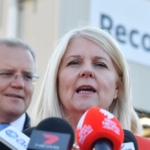Understanding philanthropic giving in Australia
Our current understanding of Australian philanthropy is lacking. Associate Professor Wendy Scaife, Project Director of Giving Australia 2016, explains why we need to know more about how and why Australians give.
The Giving Australia 2016 project is the largest research effort into philanthropic behaviour ever undertaken in Australia. It is a collaboration between the Australian Centre for Philanthropy and Nonprofit Studies at QUT, CSI Swinburne and the Centre for Corporate Public Affairs, and is supported by sector partners including Volunteering Australia, Philanthropy Australia, Fundraising Institute Australia and the Foundation for Rural and Regional Renewal. The project is funded by the Department of Social Services and is an initiative of the Prime Minister’s Community Business Partnership.
Why the research is needed
Our current knowledge of giving and givers of time, talent, influence and dollars is lacking. The most comprehensive national giving and volunteering study took place more than a decade ago in 2004-05 (Giving Australia 2005). So the effort in 2016 to examine this area is not just worthy but exciting and essential and will help to paint a more vivid picture of philanthropy in Australia.
Our sector organisations, which ubiquitously do lots with little, need evidence so they can do more and spend those scant resources most wisely. For instance, they must know what givers and volunteers need and are responding to most. Studies confirm that while generosity is a widespread value, it is enacted as much as 85% of the time through individuals or organisations asking for support (Bekkers 2005). What is it that prompts or prevents Australians answering that call for support? Why do some people of the same income/asset level give more or less time or resources than others? What are the messages our nonprofit sector needs to act upon?
We need to know too the ideas and opportunities and give breath to innovation if we want change and improvement. When countries undertake national studies of this kind – and many do – thousands of people are directly involved, major opinion leaders activated and a climate for change cultivated. Research breeds action. Those who contribute to the study from households, businesses, nonprofit and philanthropic organisations and the further thousands who interact with its findings question themselves about what is being aired and use it to frame their own future giving, volunteering and organisational practice.
How people are engaging
People from all around Australia are engaging with this initiative through focus groups, small discussion groups, and interviews. The project also includes five major surveys of key stakeholders: individual givers, charities, nonprofits undertaking fundraising and volunteering activities, foundations and philanthropic enterprises, and SMEs and large businesses. In engaging every day Australians, philanthropists, and those involved in the nonprofit sector, Giving Australia 2016 is seeking to answer questions such as
- How are giving and volunteering behaviours changing over time?
- How are innovations in social media and technology influencing giving and volunteering?
- What motivates giving and volunteering in 2016?
- What are the barriers to giving and volunteering in 2016?
- What will the future of giving and volunteering in Australia look like?
The Giving Australia 2016 project team want to get people talking and hear the counterpoint of voices so Australia can more strategically grow giving and volunteering in this country in amount and effectiveness. To participate in the research please sign up to receive updates on our website, follow us on Twitter #GivingAus2016 or visit our blog.
We know that the funding spent on this research will be leveraged many times over in greater giving and volunteering, better resourcing decisions and new relationships. Please be a part of this communal effort in any way you can.
Reference:
Bekkers, R. (2005). It’s not all in the ask. Effects and effectiveness of recruitment strategies used by nonprofits in the Netherlands (Presented paper). Washington, DC: ARNOVA-Conference.
Associate Professor Wendy Scaife BBusComn; MBusMgt, PhD, FFIA, FPRIA is Director at the Australian Centre for Philanthropy and Nonprofit Studies – QUT. Wendy studies and teaches philanthropy and fundraising and has a 25 year involvement in the philanthropy/nonprofit sectors. Her 13 years of ACPNS research spans the cause/giver spectrum. Wendy was on the Research Australia Philanthropy, Doing Good Campaign and National Compact Steering Committees, serves on FIA’s Codes Taskforce, Professional Development Committee, and on the research committees of the Charities Aid Foundation, and the US Association of Fundraising Professionals. She is on a grants committee for the Foundation for Rural and Regional Renewal and also chairs a community heritage/social capital project. Wendy was a state CEO/ national Deputy CEO of a major health nonprofit. Wendy’s’ research publications can be found at http://eprints.qut.edu.au/view/person/Scaife,_Wendy.html










